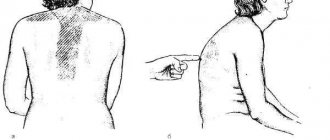The connection between menopause and dizziness
During menopause, the body's reproductive abilities decline; in women, this period begins between 45 and 50 years of age. The syndrome is manifested by inhibition of all metabolic reactions of the body and the corresponding development of chronic diseases.
Formation occurs in three stages:
- Premenopause (the activity of the main female sex hormones decreases).
- Perimenopause (menopause stops).
- Postmenopause (brings with it a number of problems associated with the operation of all systems).
Dizziness during menopause is associated with hormonal imbalances; during this period, there is a decrease in the production of estrogen and progesterone, which entails sudden changes in mood.
Insufficient hormonal levels affect the tone of blood vessels in the brain, the level of oxygen consumption by cells decreases, which contributes to frequent dizziness.
Autonomic disorders during menopause are manifested by uncontrolled changes in blood pressure and hot flashes, which provokes the development of dizziness.
Hot flashes occur when there is a sudden increase in circulating blood volume, placing additional stress on the cardiovascular system. In women, this is manifested by a sensation of rotation of surrounding objects and a lack of coordination.
Jumps in blood pressure occur due to loss of vascular permeability and elasticity, disruption of the adrenal glands and endocrine system. Constant changes in pressure can lead to ischemia due to blockage of blood vessels with cholesterol plaques. As a result, blood viscosity increases and the transport of hemoglobin to the brain becomes more difficult, which negatively affects the ability to keep your body in balance.
A disorder of the autonomic system is manifested by changes in the emotional and mental state, disturbances in excitation and inhibition occur in the central nervous system, instability in brain structures leads to vestibular pathologies.
Secondary cephalalgia
As can be seen from the table, there are many reasons for its occurrence. However, the most pressing problem specifically for menopause has been and remains the problem of arterial hypertension. When the pressure numbers increase, it happens that a similar signal arises from the body, but do not forget that it itself is able to provoke an attack of hypertension. Painful sensations are often noted in the occipital region, but can have any location. Accompanying symptoms: nausea, dizziness, weakness and others.
Such patients should be monitored by therapists, cardiologists, endocrinologists, and sometimes vascular surgeons and hematologists. Don’t forget to undergo the necessary examinations on time and come to your appointment, this will help you avoid serious attacks and control the situation. At home, you need to regularly measure your blood pressure, since it is extremely sensitive to all changing environmental conditions.
Causes of the condition
Possible causes of dizziness during menopause can be various diseases:
- Acute vestibular neuronitis (asymmetric damage to the vestibular nerve occurs, which manifests itself during premenopause).
- Vestibular neuritis (after infectious diseases, develops in perimenopause against the background of a decrease in the body’s supporting forces).
- Osteochondrosis of the cervical spine (menopause provokes muscle spasms that compress blood vessels and nerve endings going to the brain).
- Brain tumors (a growing tumor can compress surrounding tissues and compress the vestibular nerve).
- Miniere's disease (dysfunction of the inner ear, in which fluid accumulates in its cavity, can exacerbate menopausal syndrome).
- Hemorrhages in the membranes of the brain (narrowing of the lumen of blood vessels occurs, which leads to hypoxia of brain cells).
- Inflammation of the labyrinth and its arteries (severe disruption of cerebral circulation, which leads to acute dizziness).
- Acute or chronic otitis (trauma to the temporomandibular region, as a result of which the functioning of the auditory tube is disrupted).
- Epilepsy (a disorder of the vestibular apparatus is accompanied by a lack of coordination).
- Multiple sclerosis (cause of true dizziness).
Important! For most women, dizziness during menopause is benign, but if the condition causes discomfort, you should consult a specialist.
Factors provoking the development of the condition:
- stressful situations;
- emotional and physical stress;
- injuries;
- migraine;
- age-related changes;
- mental disorders;
- chemical intoxication;
- Unhealthy Lifestyle;
- prolonged exposure to the sun.
Diagnostics
Remember that the symptoms of menopause are in many ways similar to a number of other serious illnesses. Therefore, dizziness should not be immediately attributed to the aging of the body; it is better to immediately go to an appointment with a gynecologist.
He will collect his patient’s medical history, conduct a gynecological examination, take smears for the necessary laboratory tests, and if there is severe dizziness, he will send her for a consultation with an otolaryngologist to check the inner ear, etc.
In order to exclude another disease, a woman should undergo the following tests:
- blood biochemistry,
- hormonal blood test,
- Ultrasound of the genital organs,
- ECG, etc.
To diagnose dizziness, you should also undergo a series of tests:
- determining the degree of deafness,
- determination of visual acuity,
- fundus examination,
- Romberg's test
- determination of movement coordination,
- detection of nystagmus,
- galvanic test,
- MRI of cerebral vessels, etc.
Collapse
Manifestations of pathology
During menopause, the lack of sex hormones affects the functioning of all organs and systems; the severity of the clinical picture depends on the individual characteristics of the female body.
Signs and symptoms of dizziness during menopause:
- imbalance of the body;
- sensation of rotation when turning your head;
- unsteadiness of gait;
- redness of the skin during hot flashes;
- fluctuations in blood pressure;
- cardiopalmus;
- increased sweating;
- nausea;
- vomit.
Insufficient estrogen production leads to central nervous system disorders. First of all, the woman’s mental state suffers, which is manifested by uncontrollable emotions. During menopause, the work of the pituitary gland and hypothalamus is suppressed, they cease to provide the body with a sufficient amount of endorphins and the woman becomes depressed.
Diagnostic measures
To determine the cause of dizziness during menopause, a woman first needs to visit a gynecologist. The specialist must collect the patient’s life history, her complaints, conduct a gynecological examination and take smears for oncology and culture for flora. If the patient is very dizzy, the doctor prescribes a consultation with an otolaryngologist, who will check the functioning of the vestibular system and confirm or rule out concomitant diseases.
During menopause, a woman needs to undergo the following tests:
- Blood biochemistry (determination of prothrombin index and mineral composition of blood serum).
- Blood test for hormones (determines the level of follicle-stimulating hormone and estradiol).
- Ultrasound diagnosis of the uterine appendages (during menopause, follicles in the ovaries decrease or are absent).
- Electrocardiography (detects disturbances in the functioning of the cardiovascular system).
An important indicator of the beginning of the end of menstruation are hormones, the amount of which decreases in premenopause; the menstrual cycle passes without ovulation. The hormonal background at the beginning of menopause is characterized by a deficiency of progesterone, then it is formed in small doses, the amount of estrogen is half that of normal levels.
When dizziness occurs, a number of functional tests are prescribed to identify pathology:
- audiometry;
- determination of visual acuity;
- measuring the condition of the fundus;
- motor coordination test;
- index test;
- Romberg test;
- detection of nystagmus using special glasses;
- rotation test.
Special methods for studying vestibular disorders:
- electronismatography;
- videonystagmography;
- galvanic test;
- Magnetic resonance imaging of cerebral vessels.
Treatment options
Dizziness is treated using different methods. Let's look at the most effective ones.
The decision on the choice of therapeutic measures will depend on the reason that provoked such symptoms during menopause. In cases where the symptoms are associated with the development of pathological processes, specially targeted treatment is mandatory to eliminate the underlying disease.
Adjusting your lifestyle and diet
In most cases, to get rid of the unpleasant sensations during menopause, it is enough to reconsider your lifestyle.
It is necessary to drink at least two liters of clean water per day, since dehydration is often the cause of headaches. In addition, it is recommended to take 100 ml of liquid 30 minutes before meals.
Fatty, salty, spicy foods, as well as canned food and alcoholic drinks should be excluded from the diet. Such products clog blood vessels, resulting in impaired blood circulation, which will cause headaches.
It is recommended to eat fresh fruits and vegetables, dairy products, lean fish and lean meat every day.
It is important to devote more time to sports and physical activity. To keep your muscles toned, you need to regularly exercise, dance or swim. Physical activity helps relieve muscle spasms and headaches.
Medicines
In the case when the symptoms characteristic of menopause are quite aggressive, the specialist, after examination and tests, prescribes a specific treatment to the patient. To eliminate climatic syndrome, as a rule, doctors recommend the following procedures:
- homeopathic therapy;
- hormonal replacement treatment (use of female hormone analogues of synthetic origin);
- Dietary supplements or herbal supplements;
- taking antimenopausal drugs;
- vitamin therapy, when it is necessary to replenish the deficiency of elements important for the human body with the help of medications that contain vitamins A, E, C, B, as well as magnesium and calcium.
In addition, with a complex course of climacteric syndrome, it is possible to carry out complex therapeutic measures, which include the following techniques:
- hirudotherapy;
- physiotherapy;
- balneotherapy;
- acupuncture.
Typically, drug treatment is prescribed after attempts to reduce discomfort with behavioral therapy (healthy lifestyle, proper diet, exercise) or folk remedies.
If they are unsuccessful, more powerful means are used. It should be remembered that medications have a certain side effect, and the most unpleasant moment is the need to subsequently use only these medications, all others will be too mild.
In addition, the body stops solving problems on its own and begins to become “lazy,” relying on outside help.
There are several groups of drugs used.
Homeopathic:
- Remens;
- Klimadnion;
- Qi-Clim;
- Climaxan.
Hormonal:
- Divigel;
- Estriol;
- Proginov;
- Klimara;
- Dermistil.
Medicinal drugs acting directly on the vestibular apparatus:
- Vestibo;
- Betaserc;
- Vapzobral;
- Tagista.
The correct treatment for dizziness during menopause depends on what triggered it. If this is a disease, then it is this that needs to be treated, and problems with the vestibular apparatus will go away after getting rid of the disease.
In the event that menopause is the cause of vertigo, the following measures can be taken:
- Avoid overly strict “starvation” diets.
- Avoid eating too fatty, salty, spicy, fried and smoked foods, giving preference to vegetables and fruits, fish and dairy products. It is necessary to consume special vitamins and minerals, selected in a complex for women in menopause.
- Sufficient mobility and exposure to fresh air. A woman needs walking, swimming, active fitness: yoga, Pilates, dance classes, cycling, water aerobics and much more.
- Enough water throughout the day.
- Use light folk remedies recommended by your doctor.
- As prescribed by a doctor, you can use drugs that help with the symptoms of menopause, homeopathic remedies, and medications aimed at improving and stabilizing the functioning of the vestibular apparatus.
You cannot prescribe such drugs on your own; it is especially dangerous to use hormonal drugs uncontrollably. Without an accurate diagnosis, it is impossible to know what exactly provoked the woman’s condition, so such treatment may turn out to be not only risky, but even dangerous to health.
If suspicious symptoms appear, a woman should not assume that everything will go away on its own. The fact is that the symptoms of menopause can mask more dangerous signs of serious illnesses.
When dizziness occurs during menopause, treatment mainly consists of keeping the body healthy and alert, then the manifestations of menopause do not hit it so hard.
Doctors usually advise:
- normalize nutrition;
- be physically active;
- take vitamins and medications that tonic blood vessels.
Normal nutrition means the exclusion of strict diets, the introduction into the diet of a large amount of fruits, vegetables and natural juices, as well as dairy products and foods containing slow carbohydrates. Among the juices during this period, beetroot, carrot and pomegranate are especially useful. It is important to drink more and more often clean water, preferably about 2 liters per day.
Physical activity does not mean serious sports, but loads are necessary for the normal functioning of blood vessels. You need to choose activities that do not require a sudden change in body position, for example, water aerobics or swimming in the pool, different types of dancing, yoga, cycling.
Therapy for dizziness depends on the identified causes; it is aimed at relieving this symptom and treating the disease that caused it. During menopause, medications, a special diet and physical therapy are prescribed.
You will definitely need drugs that dilate blood vessels, improve blood circulation in the brain, promote oxygen saturation and reduce the frequency of dizziness:
- Nifidipin,
- Diazem,
- Amlodipine.
To improve brain activity, nootropic drugs are needed that nourish the brain and help improve metabolism in its tissues:
- Piracetam,
- Glycine,
- Cortexin.
Very effective drugs are those that thin the blood, preventing its viscosity from increasing, stagnation and causing a stroke:
- Aspirin,
- Chime,
- Plavix.
Homeopathic remedies remain popular that help relieve spasm of the blood vessels of the brain and improve their tone:
- Bravinton,
- Cavinton,
- Memory.
A woman in a menopausal state will definitely need drugs that strengthen the walls of the blood vessels of the brain and increase their elasticity:
- Askorutin,
- Flavit,
- Greenwit.
Menopause is a physiological state of the body. Let's omit the medical terminology - this is normal aging, which is associated with disturbances in the functioning of the genital area.
Collapse
Causes
Dizziness during menopause is one of the many unpleasant sensations that accompany this period. It appears suddenly and worries quite often.
Causes
Causes
If you feel dizzy due to hormonal changes, you need to combine three components:
- Proper nutrition. Strict diets are strictly prohibited; too fatty, smoked, and spicy foods should be excluded from the diet. All minerals and vitamins must be supplied to the body.
- Playing sports. It is important to choose a type that does not involve a sudden change in position. Yoga may be the best option. This allows you to increase the amount of oxygen entering the body and improve blood circulation.
- Taking hormonal drugs. Only they are able to solve the problem by eliminating not its consequences, but the root.
Dizziness during menopause significantly reduces the quality of life and therefore requires timely treatment.
Diagnosis of the condition
Before prescribing medications, the doctor will conduct a comprehensive examination and organize a consultation with specialized specialists. Among them are an otolaryngologist, a neurologist, and an ophthalmologist.
For this purpose, tests are used, including hormone levels, and hardware diagnostic methods. The results obtained will help determine the correct therapy.
Principles of treatment
The type of treatment, which is aimed at relieving the symptoms of the disease that caused this condition, depends on the cause of dizziness during menopause. In the treatment of menopausal disorders, medications, diet, physiotherapy and therapeutic exercises are used.
Treatment of dizziness during menopause with medications:
- Hormone replacement therapy. Synthetic female sex hormones are used to maintain the functional capacity of the ovaries. (Clymene, Indivina, Livial, Primella).
- Vasodilators. Improve cerebral circulation, improve oxygen saturation of cells (Nifidipine, Diazem, Verapamil, Amlodipine).
- Nootropic drugs. Stimulates the exchange of nutrients in brain tissue. (Cerobrolysin, Piracetam, Glycine, Cortexin).
- Anticoagulants. Prevents increased blood viscosity and prevents stroke. (Aspirin, Curantil, Plavix, Trenal).
- Homeopathic medicines. Relieves cerebral vascular spasm. (Bravinton, Kaviton, Gingium, Memory).
- Preparations for strengthening the walls of blood vessels. Helps maintain the elasticity of blood vessels (Ascorutin, Flavit, Greenvit).
During menopause, it is necessary to be guided by the principles of healthy nutrition; it is recommended to exclude foods containing large amounts of fat, as they provoke the development of atherosclerosis.
In your diet you should limit the consumption of the following foods:
- fatty meats;
- egg yolk;
- offal;
- smoked meats;
- strong tea and coffee.
During this period, a woman needs to include foods rich in minerals and vitamin complexes. They will help normalize metabolic reactions in the body and strengthen the walls of blood vessels.
Beneficial properties of products during menopause:
- Nuts and vegetable oil (contain vitamin E, which helps improve the functioning of the heart muscle and normalizes blood circulation in the brain).
- Seafood (contains Omega-3 fatty acids, prevents the development of dizziness, stabilizes blood pressure).
- Bran and greens (magnesium, which is included in the products, acts as a sedative for nervousness).
What might the symptoms be?
Tides
Vascular disorders
Dizziness during menopause, the treatment of which must be entrusted to specialists, is not uncommon as a sign of menopause. This symptom is not very typical for this period of a woman’s life, but it causes discomfort and anxiety.
This condition can take you by surprise: while driving, at a pedestrian crossing, at work. In this case, some confusion and, in severe cases, loss of consciousness can lead to irreversible consequences.
Therefore, in order to prevent dizziness, it is necessary to accurately identify the cause of this condition. And this can only be done by a qualified specialist.
Vertigo during menopause in women
A condition in which there is a feeling of imbalance or rotation of surrounding objects is vertigo. This type of dizziness is the most common imbalance and pre-syncope condition. This does not allow you to fully work and live during this period. Some women do not leave the house for fear of fainting.
Among the reasons causing this condition is a lack of the hormones estrogen and progesterone. The first of them ensures the functioning of the brain, and the second, synthesized in the brain, has a direct effect on the emotional state during this period.
Another cause is a pathology of the inner ear - peripheral cochleovestibular disorder. If a woman is not in a state of menopause, then this pathology does not manifest itself as often as during menopause.
The permeability of blood vessels is damaged, and the normal blood supply to the inner ear is disrupted. The reasons for this condition include:
- ischemia;
- rheological transformations of blood;
- disturbance of carbohydrate metabolism;
- hyperlipidemia;
- lack of estradiol.
Doctors count more than 100 causes of dizziness during menopause. Hormonal changes, loss of hemoglobin, anemia, oxygen starvation, pressure surges - this is all associated with the menopause. But often dizziness can also be a signal of very serious illnesses. Therefore, you should not postpone your visit to the doctor. Only an examination will give a complete picture of this condition.
Treatment of dizziness during menopause
The research begins with taking samples. It is recommended to undergo an examination for the level of hormones in the blood, hemoglobin, the presence of sugar and its norms. If no significant changes are observed, therapy with drugs or folk remedies is prescribed.
Drugs that improve blood flow are especially important. Hormone therapy will help compensate for the lack of estrogen. Pharmacological companies have developed modern drugs to combat dizziness during menopause.
These include Remens, Femoston, Klimonor, Proginova.
Various homeopathic remedies are very popular. They contain plant hormones that are similar in structure to female hormones. A prominent representative of this group of drugs is Klimaktoplan. It normalizes vegetative-vascular changes, promotes good sleep and eliminates mood swings.
Special therapeutic healing techniques will help relieve the symptoms of dizziness and always control this condition. This is performing some physical exercises aimed at gaining strength, normal balance, coordination and muscle stretching. Yoga techniques are ideal for this, as they allow you to relax.
In some cases, after examinations, it is revealed that the woman has ataxic vertigo syndrome. In this case, surgical intervention is necessary. Surgeons perform surgery on the auditory nerve or labyrinth of the ear.
Water consumption should be increased to 8 glasses per day. Vegetables and fruits, fish, dairy products can be good prevention during menopause.
Calcium, magnesium and vitamin E will help you successfully overcome hormonal surges during menopause.
Traditional medicine is used for dizziness during menopause. There must be a system in the use of herbal decoctions. Only then will the result be visible.
The menopause period is characterized by multiple symptoms, one of them is dizziness. Dizziness cannot be confused with anything.
This symptom appears during menopause, and causes the greatest concern among specialists, since it is atypical for most women. But dizziness is characteristic of menopause in many women and there are many reasons for this.
Dizziness can appear abruptly and can be of various types.
Dizziness is a common symptom of menopause
During menopause, you may feel dizzy. This may be an independent sign of the onset of menopausal syndrome.
Folk recipes
Folk remedies are widely used among the female population; they can be used to combat various manifestations of the condition. The advantage of this method is the minimum of side effects due to the use of natural ingredients.
Recipes for medicinal preparations for dizziness caused by menopause:
- 1 tbsp. l. hawthorn fruit, 1 tsp. peppermint, 1 tsp. white mistletoe. Pour 200 ml of boiling water over the mixture, leave for 15 minutes, use 0.5 cups after meals.
- 1 tsp. thyme, 1 tbsp. l. lemon balm, and 1 tbsp. l. chopped blackberry leaves. Pour the mixture with 1 cup of boiling water and leave for 20 minutes. Take 1-2 glasses after meals for 10 days.
How to improve your health
Treatment of dizziness has a complex effect and is associated with conventional measures for menopause.
To eliminate ailments the following are used:
- diet. You should not indulge in sweet, spicy or fatty foods. Vegetables are indicated, especially vegetable juices, fresh fruits, and dairy products. It is necessary to consume a sufficient amount of fluid - at least 2 liters per day;
- active lifestyle. Physical activity (in moderation), dancing, cycling, swimming, etc. are shown;
- use of traditional folk medicine;
- drug treatment.
All methods are good in their own way, the most effective of them is prescribed by a doctor who can determine the most useful and appropriate method.
Dizziness during menopause: symptoms, treatment
During menopause, a restructuring of the entire female body, its systems and organs occurs. This complex procedure leads to the woman constantly feeling tired, apathetic and unwell. Can you feel dizzy during menopause?
Of course, dizziness during menopause is one of the symptoms that there is a hormonal imbalance in the female body. This is an essential component of the entire menopausal syndrome. So why do you feel dizzy during menopause and what to do?
Lower back pain during menopause
The back and lower back hurt during menopause due to a lack of calcium in the body, which is also characterized by age-related changes in bone tissue. Among other things, a woman during menopause often gains extra pounds, which also increases the load on the spine and joints.
Nerve endings are concentrated in the spine, so the back and lower back can hurt even when a woman lifts weights, does backbreaking physical work, or bends too low.
To prevent back pain, you need to limit weight lifting and heavy physical work, or keep it all to a minimum. But since it is quite difficult to do this in the modern rhythm of life, it is worth finding a middle ground. To do this, you just need to listen to your feelings, pay attention to pain, because it is this that indicates that something is going wrong in the body’s functioning.
The connection between menopause and dizziness
During the entire period of menopause, which occurs in a woman at the age of 45-50, the menopausal syndrome manifests itself in the form of a gradual decline in sexual functions and a slowdown or suppression of metabolism in the woman’s body.
Menopause occurs in three stages:
- The active functioning of sex hormones gradually decreases and then completely stops. A woman of Balzac's age is less and less interested in sexual relations.
- The menstrual cycle slows down, periods no longer come every month, and then disappear completely. The body no longer matures a new egg every month and does not ovulate.
- Together with the sexual function, other functions of the body fade away, gradually it ages, becomes decrepit and becomes unusable. This stage of menopause is characterized by the identification of many chronic diseases and pathologies.
Where can I get information?
More and more attention in the world is now being paid to the problem we glorify. The International Headache Society and other organizations have existed for more than 15 years. In our country, a similar Russian society was created in 2007. They all publish various useful information that everyone can read. For example, on the website www.headache-society.ru
Do not forget that, although rarely, serious diseases can be hidden under the mask of a harmless symptom. Visit your doctor regularly and get tested. And be healthy!
Classification of dizziness
- Vertigo
The woman feels how the objects and people around her begin to spin around her, or she herself spins around them. Black spots appear in the eyes, and then it gets completely dark, sometimes there are flashes of light.
The woman stops coordinating the movements of her body, cannot move independently, so she stops in place and waits for the attack of dizziness to gradually pass.
An attack of vertigo occurs, there is darkness in the eyes, the heart rhythm is lost, an attack of nausea appears, and then vomiting. When trying to change the position of the body, the attack intensifies and leads to fainting.
Headaches during menopause
Headaches are quite common accompaniments of menopause: they border on depression and apathy, which prevent women from relaxing and enjoying life. In addition to depression, such symptoms can be caused by the fact that a woman’s spine, shoulders, and neck are too tense. Sometimes women also get headaches because they tie their hair too tightly.
If a headache attack occurs suddenly, and it causes your temples and forehead to ache, your vision becomes dark, and your palms sweat, then this is a clear sign of migraines.
If pain occurs most often in the back of the head, and in the morning you notice swelling of the face, then you should monitor your blood pressure, as such symptoms indicate its increase.
Among other things, pain in the head area can occur in women due to taking certain medications as a side effect of them. It follows from this that no medications should be taken without a doctor’s prescription, and if side effects occur, then immediately contact him again and complain about it.
Attention! If during menopause women experience pain in various parts of the body, then the best way to get rid of them is physical activity. This could be exercises in the pool, in the gym, in a dance class, or just walking in the park, refusing to use public transport, yoga, morning exercises or exercises with dumbbells. Just choose what suits you best and start training. The main thing is to do exercises regularly, and not occasionally.
Thus, pain during menopause in women is an understandable phenomenon, but abnormal. Therefore, consult a doctor as soon as possible, first finding out what exactly is hurting you, even if it seems that there is pain throughout your whole body.
Menopause is a period of life in which self-medication can not only be useless, but also significantly harm a woman, therefore, for treatment and further recommendations on this matter, you should only contact specialists.
Interesting and educational video on this topic:
About
Causes of dizziness
Dizziness in women during menopause is primarily associated with hormonal disruptions occurring in her body. At this time, the amount of estrogen and other sex hormones in the blood decreases significantly.
The lack of hormones seriously affects the tone of the blood vessels of the brain, so its cells consume less oxygen, which is why attacks of dizziness occur.
In addition, symptoms such as sudden changes in blood pressure and periodic hot flashes begin to appear. All this also contributes to sudden dizziness.
During a hot flash, the volume of blood in the vessels increases significantly, which seriously overloads the circulatory system. The woman begins to feel that various objects are rotating around her and may lose coordination.
Jumps in blood pressure also occur due to the fact that the vessels lose their elasticity, become more permeable, and the functioning of the adrenal glands and endocrine system is no longer so effective.
Constant surges in pressure lead to blockage of blood vessels and the development of cardiac ischemia. As a result, the blood becomes more viscous, and the transport of hemoglobin to the brain becomes more difficult. All this also provokes dizziness.
The autonomic nervous system also does not work at full strength, which manifests itself in a negative emotional and painful mental state. The central nervous system works unstably, causing pathologies of the vestibular apparatus.
Causes of the disease
Experts identify many provoking factors that influence the development of cephalalgia and dizziness. The main reason is considered to be hormonal imbalance. A decrease in estrogen concentration contributes to changes affecting not only the reproductive system, but also the body as a whole. All metabolic processes are subject to them.
Tides
Against the background of a sharp blood flow in the upper body, hyperhidrosis may develop, as well as a feeling of heat. Such conditions last a short time, but despite this, the vessels are subject to increased stress, which causes the appearance of:
- dizziness;
- nausea;
- weaknesses;
- lack of oxygen;
- fatigue.
The number of tides per day can reach about fifty.
Psycho-emotional instability
Hormonal imbalance is accompanied by frequent mood swings, stress, depression, tearfulness, irritability, which, in turn, cause headaches. A woman is often exposed to emotions, as a rule, cannot fall asleep for a long time, sleeps poorly.
As a result, there is no proper night's rest. Over time, chronic fatigue begins to accumulate, against the background of which problems develop in the functioning of the vestibular apparatus, causing dizziness.
Vascular disorders
Dizziness during menopause in different women can be provoked by the following conditions:
- Pressure surges. Due to a decrease in estrogen production, the walls of blood vessels lose their elasticity and become fragile and brittle. The number of cholesterol plaques increases, they block blood flow, and the brain suffers from a lack of oxygen. As a result, a woman may experience short-term bouts of dizziness.
- Tides. The sudden flow of blood to the head suddenly dilates the blood vessels, which can also be accompanied by dizziness.
- Headaches caused by vascular spasms can cause attacks of dizziness.
- Psychological imbalances. Sudden changes in hormone levels cause increased nervousness and irritability, which can also be accompanied by balance problems.
- Insomnia, especially if it becomes a regular occurrence, is very exhausting and leads to dysfunction of the vestibular apparatus.
When the signs of menopause pass, but the disturbances persist, the woman has a question: can she feel dizzy under the influence of the disease?
Dizziness in women during menopause is primarily associated with hormonal disruptions occurring in her body. At this time, the amount of estrogen and other sex hormones in the blood decreases significantly.
Those times when the doctor could not explain to the patient why he was dizzy, and this condition was considered a sign of aristocracy, are long gone. It has been established that it is harmful to health and requires treatment. Women can often experience dizziness during menopause, both for natural reasons and as a result of the development of diseases. Let's look at the signs and symptoms of this phenomenon.
Causes of dizziness
The female body has been supported by the hormone estrogen for many years. During menopause, its quantity is reduced to a minimum, as a result of which the condition of the blood vessels changes, there is not enough oxygen to saturate the brain, and physical and psychological exhaustion occurs.
Thus, the main cause of dizziness during menopause is a hormone imbalance. However, sometimes this condition can be associated with health problems not related to menopause.
Collapse
Dizziness is a condition in which a loss of balance occurs and objects feel spinning. Sometimes the size of objects and the distance between them are distorted.
Most people do not pay attention to this phenomenon. However, dizziness during menopause can be dangerous and have complications.
The article describes what leads to dizziness, how it manifests itself and what ways it can be cured.
Causes
During menopause, serious hormonal changes occur in the body, which is why the menopause is accompanied by serious changes in a woman’s well-being. The level of estrogen in the body drops and tissues that do not receive it in the proper amount:
- They cease to be elastic.
- They cease their direct function when it comes to the reproductive capabilities of the body.
- They enter into an imbalance with the general condition of the body, causing characteristic symptoms of menopause.
When the body did not enter the menopause stage, the hormonal levels were normal and a pattern was observed in the production of sex hormones. But with the onset of menopause, the reproduction of hormones occurs in a chaotic manner, and the body reacts by functioning in an unusual rhythm.
Various unpleasant symptoms during menopause appear because the body changes at the hormonal level. Some hormones and other substances that supported it throughout life cease to be produced. Previously, the amount of hormones changed harmoniously, but now the process defies rules.
The presence of dizziness can also be a symptom of other diseases. Therefore, you also need to pay attention to other manifestations, for example, pain, their nature, increased temperature, pressure, and the presence of discharge from the auricle. They will help determine what to do to reduce symptoms.
Diseases that cause dizziness during menopause
There are a number of diseases and pathologies that contribute to increased dizziness:
1. Vestibular neuronitis
With this disease, the nerve of the vestibular apparatus is affected, and this is fully manifested during menopause.
2. Vestibular neuritis
The disease manifests itself after infections and develops during menopause against the background of a general weakening of the female body.
3. Osteochondrosis of the cervical vertebrae
Changes in the body during menopause can provoke muscle spasms, which in turn compress the blood vessels and nerves leading to the brain.
4. Brain tumor
A developing malignant tumor puts pressure on brain tissue in general and on the vestibular apparatus in particular.
5. Miniere's disease
This is a malfunction of the inner ear when fluid accumulates in its cavity, which increases dizziness.
6. Traumatic brain injuries
As a result of TBI, hemorrhage occurs under the skull, the blood vessels of the head narrow, which causes oxygen starvation of brain cells.
7. The causes of dizziness in women during menopause can also be: inflammation of the labyrinth, otitis media, epilepsy, multiple sclerosis, etc.
It is important to know that in most women, dizziness during menopause is completely benign, but if this symptom only intensifies over time, you should immediately consult a doctor.
Diseases that cause dizziness
Not only ordinary hormonal changes can cause dizziness, there may also be serious reasons associated with it. It happens that menopause contributes to the development of diseases affecting the vestibular apparatus :
- Cervical osteochondrosis. Pinched nerves interfere with proper blood supply to the brain. Disorientation and severe pain caused by a sharp turn of the head;
- Brain tumor. And the benign tumor increases in size. It is also capable of putting pressure on tissues and blood vessels. Neoplasms cause dizziness, which only becomes stronger with changes in body posture and physical activity. The disease manifests itself in the presence of pain, the appearance of deafness and deterioration of vision;
- Disease of the visual muscles. Light and quickly ending whirling, there is a feeling of images flashing before the eyes.
- Stroke. Violation of the integrity of blood vessels causes severe dizziness, double vision appears, and weakness is felt throughout the body. A pronounced lack of coordination of movements and lack of coherent speech;
- Meniere's disease. The resulting fluid in the cavity of the inner ear puts pressure on it. Most often this is a consequence of injury or infection. Diagnosis can be made by bouts of vomiting, sweating, ringing in the ears, loss of balance and inability to sit;
- Peripheral cochestibular disorder. The onset of the disease occurs before menopause, and during menopause an exacerbation occurs, which causes the disease to manifest itself due to poor oxygen supply;
- Vestibular neuritis. In other words, nerve excitation. Abrupt appearance and disappearance of whirling. The head begins to feel dizzy from turning the head to the side and lifting it up;
- Multiple sclerosis. This disease is characterized by inflammation of the brain and nerve sheath. It is important to start treatment early in the disease;
- Perilymphatic fistula. It is characterized by the presence of an extra hole in the tympanic cavity, allowing fluid to pass into the middle ear area. It appears as a result of chronic otitis media or injury. Additional symptoms may include noise in the head with clicking in the ear area, and hearing loss.
Factors that provoke dizziness during menopause
In adulthood and during menopause, women should avoid situations that increase dizziness. It can be:
- serious stress,
- physical overload,
- head injuries,
- migraine attacks,
- chemical intoxication,
- Unhealthy Lifestyle,
- exposure to direct sunlight, etc.
Causes of feeling unsteady and unsteady when walking
Patients usually describe unsteadiness and instability during gait in different ways. For some, this symptom is only mild dizziness, for others it is a noticeable stagger when walking. And still others cannot clearly explain what they mean when they talk about their condition and call it “a feeling of instability in the head.” However, such a manifestation is always unpleasant for patients; in some cases, not understanding what triggered it can cause people to become very fearful for their health.
How does the feeling of unsteadiness and instability manifest when walking?
The following signs may accompany the symptom:
- impaired coordination;
- dizziness;
- feeling as if “the ground is moving away from under your feet” when standing or walking;
- frequent trips or falls;
- weakness in the legs (“cotton” legs);
- unnatural gait;
- difficulty moving up stairs;
- sways from side to side when walking;
- difficulty moving the legs after a long rest;
- Preferred support on the heels when walking.
Feeling unsteady can indicate the presence of many diseases. These may be osteochondrosis, atherosclerosis, traumatic brain injuries, arthritis, central nervous system diseases, foot deformities, etc. If a patient experiences a strong feeling of unsteadiness when walking, he is usually prescribed certain diagnostic methods.
- Studying the patient's steps with eyes open and closed.
- Examination of gait when moving to the side, as well as when moving backwards.
- Detection of changes when moving around an object (for example, a chair).
- Studying heel and toe steps, body turns, slow and fast steps.
- Observing the patient's gait on the stairs.
Consultations with various specialists (endocrinologist, otolaryngologist, neurologist) may also be prescribed and CT, MRI and other studies may be performed.
Psychological causes of gait unsteadiness and instability
Often, the feeling of unsteadiness when walking is provoked by such reasons as VSD, long-term depression, stress, neuroses, intense anxiety and uncontrollable fears. It is known that psycho-emotional stress can cause many unpleasant and even painful symptoms that have a negative impact on the patient’s condition as a whole. Among them:
- difficulty breathing and tightness in the throat;
- weakness, nausea, vomiting;
- bowel movements (especially diarrhea or constipation);
- trembling, coldness or numbness of the limbs;
- high blood pressure, palpitations;
- panic attacks accompanied by fear of death.
As a rule, with VSD, due to high anxiety, the patient often experiences surges in blood pressure, which can lead not only to darkening of the eyes, the appearance of floaters, blurred vision, dizziness and tinnitus, but also to a feeling of instability and unsteadiness when standing or walking .
With intense anxiety, which is a constant companion of VSD and phobias, various respiratory disorders often appear (suffocation, a feeling of incomplete inhalation or exhalation, shortness of breath, weakness in the legs, a feeling of derealization), which can also affect the emergence of feelings of instability and uncertainty.
People have this expression: “the ground disappears from under your feet.” That is, if a person is under severe stress, he may experience a loss of support and thus a loss of stability, balance and self-confidence. Well, people with an anxiety disorder such as VSD are constantly under such stress. Therefore, it is not surprising that they experience dizziness and staggering when walking.
Abdominal pain during menopause
Indicators of how menopause is progressing are determined by the genitals. Everyone understands that a woman’s genital organs are concentrated in the pelvic area, so if any problems occur with the organs of the reproductive system, pain occurs in the pubic area and lower abdomen.
However, pain in the lower abdomen is not always caused by diseases of the internal organs of the small pelvis. Often psychosomatic reasons are to blame, since a woman during menopause experiences despondency and apathy; this condition often borders on depression. They understand that youth is fading, that their appearance is no longer so attractive and beautiful. Often a woman is not entirely satisfied with her life, it seems to her that everything was in vain and she achieved nothing.
Such soul-searching often ends in pain of a psychosomatic nature. Some people, due to constant nervousness, experience problems with the stomach and digestion, and loose stools.
Of course, all the pain can be attributed to the fact that it arose from nerves, but still it would not be superfluous to go for a consultation with a gynecologist, and also with a gastroenterologist, if only to simply rule out the possibility of developing diseases of the stomach and pelvic organs among women.
If, however, during the examinations nothing out of the ordinary was discovered, then it is worth visiting a psychologist who will help put your thoughts in order and direct your soul-searching in the right direction.









